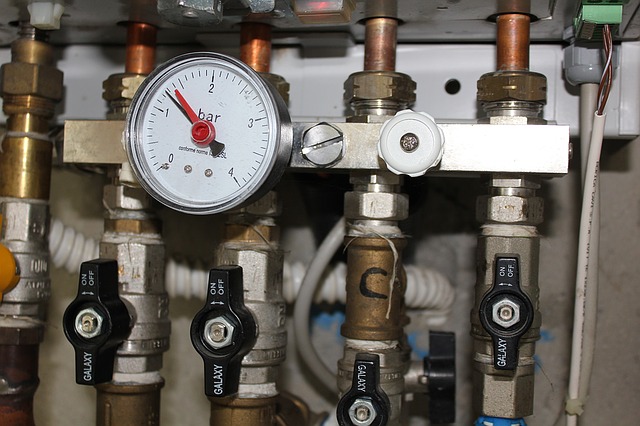Why is There No Hot Water From the Gas or Electric Water Heater?
You expect hot water to flow out of your shower or sink when you turn on the faucet. It can be very unpleasant to find no hot water or have to take a cold shower. You might be concerned about your water heater’s energy efficiency or whether you have natural gas leaks.
Table of Contents
Common Problems in Both Gas and Electric Water Heaters
There are many possible reasons why hot water is not flowing in your home, so don’t let your mind drift to the worst. Find out whether your home is equipped with an electric or gas water heater to start troubleshooting. Here are some common causes of water problems and the best ways to fix them.

1. Water Heater Does Not Require Gas
The problem is usually caused by a low gas supply. Check your gas supply if you notice no hot water or the gas water heater is turned on.
It is possible that you have accidentally turned off your gas supply. Or, the button could be defective. If this happens, turn off your gas supply and switch to “pilot”. Then remove the cover from the burner and the pilot light.
2. Leaking Tank
Water must be present in the tank for a water heater’s job to work. It is possible that there is no hot water in the tank. A full tank is dangerous and not energy-efficient. Check the connections between the appliance’s valves and the pipes. Check the tank’s compartment to make sure they are secure. It’s likely that the appliance needs to be replaced if there is any water in the compartment.
3. No Pilot Light
If there is no flame, it is likely that your pilot light has gone out. If this happens, you will need to relight the pilot light.
You should know, however, that not all heaters come with pilot lights. They now come with glow plugs and spark ignitors. You might need to contact trained personnel if this happens. Or, you can try fixing the problem yourself by consulting the owner’s manual.
4. Electric Water Heater Malfunction
When it comes to your water heater, energy efficiency is crucial. An electric or gas water heater is effective in ensuring that hot water does not go out of the home. What is the difference between an electric and a gas water heater? Electric heaters, on the other hand, require electricity.
Turn off the heater if your home doesn’t have hot water. Next, turn off the circuit breaker. After about an hour, the circuit breaker will trip again and your home will get hot water. If the circuit breaker continues to trip, it is a sign that something is wrong. So hit the reset button. Talk to a qualified electrician if the problem persists.
5. Tripped Breaker
To determine if the electric water heater has a switch that is being turned off, inspect it. To determine if the circuit breaker has tripped, inspect the circuit breaker box.
Although a breaker may not have tripped in the opposite direction to others, it will still be out of alignment. It is easy to reset the breaker if it has tripped. Resetting the device will fix it.
If the breaker keeps going off after you reset it again, contact a licensed electrician. All circuit breaker components must be in working order for water heaters to work properly. Call an electrician immediately if your circuit breaker is not working properly.
6. Failing Gas Valve
If you have a gas water heater, but no hot water, it is worth checking the supply line. Check the gas valve to make sure there are no leaks. You must make sure it is secure and in the right place. Double-check that the gas valve is turned on. Check the pilot light to make sure the gas valve is open. The pilot may need to be re-lit several times. It should always be lit. It must stay lit.
If none of the above steps produce hot water within an hour, it might be time to get a new, more efficient water heater. For assurance, consult the experts.
7. Faulty High Temperature Cutoff Switch
High-temperature cutoff switches that trip are one of the main reasons hot water does not come into your home. It can be fixed by simply opening the switch, pressing a button, and then closing it again.
Push it and you’ll hear a clicking sound. Then the power will return to your water heater. If power is not restored, the heater’s high-temperature cutoff may be defective and should be replaced.
8. Thermostats That are Not Working Properly
The thermostat should be set between 120 and 140 degrees Fahrenheit in order to heat water efficiently and produce hot water. Check the thermostat to see if hot water is not available or if the temperature is too high. It should be replaced if the thermostat is damaged. Even if the thermostat is functioning properly, it can still be a problem due to sediment buildup. Flushing your water heater is the best way to fix this.
9. Faulty Heating Elements
Heating elements can sometimes be the reason why hot water does not run in your home. Water heaters are only good for 10 years. It is worth replacing an old one. If you have to replace heating elements, make sure you turn off the water heater.
10. Tank Size
Your household will not be as efficient if your tank is too small. You’ll run out of hot water faster. Perhaps the appliance was effective when you were just yourself and your spouse. However, as your family grew, so did the need for hot water. It’s time to upgrade your hot water tank. Keep in mind that heating water with electric heaters takes longer than heating water with gas heaters.
11. The Weather
How quickly water can heat depends on the outside temperature. Even in areas like the Southwest, water heater tanks’ energy efficiency and performance can be affected by the cold. Your system can be affected by cold snaps and water problems if you live in an area with frequent snowfalls. It is possible to wait out the cold, then insulate your appliance.
12. A Flooded Container
If the compartment becomes flooded, it is likely that water has made its way inside. If water gets into the thermostat, it can cause malfunctions..
Gas Water Heater: Why No Hot Water?
Gas water heaters are popular for their fast heating ability, but they can experience unique issues that prevent hot water from flowing. Let’s take a closer look at some of the typical culprits:
1. Pilot Light is Out
One of the most common reasons for a gas water heater to stop working is that the pilot light has gone out. Without a lit pilot light, the burner won’t ignite, and no hot water will be produced.
How to Fix It:
- Check if the pilot light is on. If it’s out, follow your manufacturer’s instructions to relight it.
- If the pilot light won’t stay lit, there could be a problem with the thermocouple (the sensor that detects whether the pilot light is on). You may need to clean or replace it.
2. Faulty Thermocouple
As mentioned, the thermocouple is a small safety device that shuts off the gas if it doesn’t sense a flame. If it’s dirty or damaged, it might incorrectly signal that the pilot light is out, cutting off the gas flow.
Signs of a Bad Thermocouple:
- The pilot light repeatedly goes out.
- You try to relight it, but it won’t stay lit.
Solution:
Replacing the thermocouple is usually straightforward and inexpensive. You can do it yourself or hire a professional if you’re not comfortable working with gas appliances.
3. Clogged Burner or Dirty Orifices
Burner assemblies can accumulate dirt and debris over time, preventing the gas from igniting properly. This leads to either no hot water or water that takes much longer to heat up.
Cleaning the Burner:
- Turn off the gas supply and allow the unit to cool down.
- Remove the burner assembly and clean it using a brush and compressed air.
- Ensure all openings are clear before reassembling.
Electric Water Heater: Why No Hot Water?
Electric water heaters work differently from gas models, relying on heating elements powered by electricity. When there’s no hot water, it often points to electrical or mechanical problems.
1. Defective Heating Elements
Electric water heaters typically have two heating elements—one at the top and one at the bottom. If either of these fails, the water heater won’t heat properly.
Testing the Heating Elements:
- Turn off the power to the water heater at the circuit breaker.
- Use a multimeter to check the resistance of the elements. A reading of zero or infinity indicates a faulty element.
- If either element is defective, it will need to be replaced.
2. Reset Button Tripped
Electric water heaters have a high-temperature limit switch that can trip if the water gets too hot. When this happens, the reset button pops out, cutting off power to the heating elements.
How to Reset It:
- Turn off the power to the heater.
- Open the access panel and press the red reset button.
- If the button keeps tripping, the thermostat or heating element may need replacing.
3. Faulty Thermostat
Each heating element has a thermostat that controls when it turns on and off. If a thermostat fails, it can prevent the corresponding element from heating water.
Preventive Maintenance Tips
Regular maintenance can help prevent many of the issues mentioned above. Here are some simple steps you can take to keep your water heater running smoothly:
- Flush the Tank Annually
This helps remove sediment buildup and improves efficiency. - Inspect the Anode Rod
The anode rod prevents tank corrosion. Replace it every 3-5 years or when it’s heavily corroded. - Check the Pressure Relief Valve
Test the valve periodically to ensure it’s working correctly. - Insulate the Pipes
In colder climates, pipe insulation can help maintain water temperature. - Schedule Professional Inspections
Having a professional inspect your water heater once a year can catch potential problems early.
If Water is Not Hot Enough
You may be experiencing intermittent problems with the water heater. If the water heater is large enough to meet the application you desire, the component that is in need of repair is the one listed below.
You can check the thermostats
The thermostat may need to be changed if the temperature control has been set correctly. A failed thermostat can often be the cause of hot temperatures that are not high enough, as we have already mentioned.
Examine Burner
The water may not heat correctly if it is contaminated by sediment on the burner of a gas water heater. Although it is rare, the burner assembly itself can fail. Although it is possible to replace the burner assembly yourself, it is best to hire professionals.
Examine Dip Tube
Although this is rare, it can happen. Although it is unlikely that you have one among the 20 million water heaters made between 1993 and 1996, which had brittle polypropylene tube tubes, even the ones from the last few years are not guaranteed against failure. You will need to replace your water heater dip tube if it fails.
Loose wiring
An electric water hearing can malfunction if there are loose connections. Check that the connections are clean and free from corrosion. Although this is not a common problem, it’s worth checking.
Recommendations for DIY Repairs
If you are looking for energy efficiency in your home, it may be worth replacing or repairing the water heater yourself. It is best to have a qualified electrician handle the job. If you are a DIY enthusiast and have some experience, these tools will be useful to you:
- Screwdriver
- Wrench
- Tape for plumbers and electricians
- Safety glasses
- Soldering torch
- Tube cutter
The type of heater you have will determine the tools that you need.
Conclusion
When your water heater suddenly stops providing hot water, it can feel like a major inconvenience. Thankfully, most of the common issues—whether with a gas or electric model—are fairly simple to diagnose and fix. By understanding the basic mechanics of your water heater and performing regular maintenance, you can ensure it runs smoothly for years to come. If you ever feel unsure about a repair, don’t hesitate to call a professional. After all, staying safe around gas and electricity is always the top priority.
FAQs
A typical water heater lasts around 8 to 12 years, depending on the type, maintenance, and water quality. Regular upkeep, like flushing the tank and checking for leaks, can extend its lifespan. However, older units may become less efficient and require replacement as they age.
Strange noises from a water heater are usually caused by sediment buildup at the bottom of the tank. As water heats up, the sediment creates popping or rumbling sounds as it traps air. Over time, this can reduce efficiency. Another possibility is a malfunctioning heating element or a valve issue. If the heater is producing a high-pitched whining noise, it may indicate mineral deposits on the heating element, causing it to work harder. It’s advisable to flush the tank regularly to prevent sediment buildup and ensure proper functioning. If the noise persists, consider consulting a professional plumber for a checkup.
You can replace a broken heating element yourself if you have basic plumbing and electrical skills. First, turn off the power and water supply to the heater. Drain the tank, remove the old element, and install the new one. However, if you’re unfamiliar with electrical work or plumbing, it’s safer to call a professional to avoid potential risks, such as electrical shock or improper installation. Regular maintenance and inspections can help prevent future issues with heating elements.
Signs of a faulty thermostat include inconsistent water temperature, the heater not turning on or off, or it cycling too often. If you notice temperature fluctuations or no hot water despite the heater running, the thermostat may be malfunctioning. Testing with a multimeter or professional inspection can confirm the issue.
If your water heater is over 10 years old, requires frequent repairs, or has major issues like leaks or constant temperature problems, replacement might be more cost-effective in the long run. However, if the damage is minor and the unit is still relatively young, repairing can extend its lifespan.
The size of the water heater you need depends on your household size and daily hot water usage. For a family of 1-2 people, a 30-40 gallon tank is typically sufficient. A family of 3-4 people usually needs a 50-60 gallon tank, while larger households with 5 or more people may require an 80-gallon tank. If you’re considering a tankless water heater, check the flow rate (gallons per minute) needed for simultaneous hot water usage (e.g., showers, dishwashing). Oversizing can waste energy, while undersizing may leave you without enough hot water, so choose wisely based on your home’s needs.















